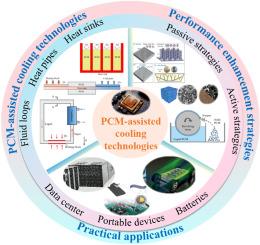电子冷却潜热储存技术的研究进展
IF 16.3
1区 工程技术
Q1 ENERGY & FUELS
引用次数: 0
摘要
电子和信息技术的快速发展导致了更小、更集成和更智能的设备,导致更高的封装密度和电子芯片中的热流密度增加。它会降低性能并造成不可逆转的损坏,影响电子系统的功能和寿命。在有限的空间内增强瞬时散热对能源效率和系统可持续性至关重要。本文综述了结合潜热储存(LHS)的高效传热技术的最新进展,重点对pcm辅助冷却进行了优化,并总结了潜热储存在电子冷却中的应用。pcm辅助冷却技术显著提高了电子设备的热管理能力。散热器、热管和流体回路的战略集成有效地解决了热负荷,提高了传热效率,减少了对外部冷却机制的依赖,提供了强大的热管理解决方案。被动冷却方法显著提高了PCM的传热效率,而主动冷却方法为提高PCM的性能提供了新的途径。因此,随着科学技术的不断进步,LHS技术在电子冷却领域显示出巨大的潜力。预计将进一步优化,以提供更有效的热管理解决方案,延长电子元件的使用寿命和可靠性。通过全面了解电子冷却的LHS,这项工作旨在激发创新的热管理方法,提高电子系统的可靠性和能源效率,特别是在瞬态热事件期间。本文章由计算机程序翻译,如有差异,请以英文原文为准。

Advances in latent heat storage technology for electronic cooling
The rapid advancement of electronic and information technologies has led to smaller, more integrated, and smarter devices, resulting in higher packaging densities and increased heat flux in electronic chips. It can degrade performance and cause irreversible damage, impacting the functionality and lifespan of electronic systems. Enhancing instantaneous heat dissipation within limited spaces is crucial for energy efficiency and system sustainability. This study reviews the latest advancements in high-efficiency heat transfer technologies combined with latent heat storage (LHS), focusing on optimizing PCM-assisted cooling and summarizing the applications of LHS in electronic cooling. PCM-assisted cooling technologies significantly enhance the thermal management capabilities of electronic devices. The strategic integration of heat sinks, heat pipes, and fluid circuits effectively addresses thermal loads, improves heat transfer efficiency, and reduces reliance on external cooling mechanisms, providing robust thermal management solutions. Passive cooling methods significantly improve the thermal transfer efficiency of PCMs while active cooling methods offer new avenues for enhancing PCM performance. Therefore, LHS technology shows great potential in the field of electronic cooling, and with ongoing advancements in science and technology. It is expected to be further optimized to provide more efficient thermal management solutions, extending the lifespan and reliability of electronic components. By providing a comprehensive understanding of LHS for electronic cooling, this work aims to inspire innovative thermal management approaches that enhance the reliability and energy efficiency of electronic systems, especially during transient thermal events.
求助全文
通过发布文献求助,成功后即可免费获取论文全文。
去求助
来源期刊

Renewable and Sustainable Energy Reviews
工程技术-能源与燃料
CiteScore
31.20
自引率
5.70%
发文量
1055
审稿时长
62 days
期刊介绍:
The mission of Renewable and Sustainable Energy Reviews is to disseminate the most compelling and pertinent critical insights in renewable and sustainable energy, fostering collaboration among the research community, private sector, and policy and decision makers. The journal aims to exchange challenges, solutions, innovative concepts, and technologies, contributing to sustainable development, the transition to a low-carbon future, and the attainment of emissions targets outlined by the United Nations Framework Convention on Climate Change.
Renewable and Sustainable Energy Reviews publishes a diverse range of content, including review papers, original research, case studies, and analyses of new technologies, all featuring a substantial review component such as critique, comparison, or analysis. Introducing a distinctive paper type, Expert Insights, the journal presents commissioned mini-reviews authored by field leaders, addressing topics of significant interest. Case studies undergo consideration only if they showcase the work's applicability to other regions or contribute valuable insights to the broader field of renewable and sustainable energy. Notably, a bibliographic or literature review lacking critical analysis is deemed unsuitable for publication.
 求助内容:
求助内容: 应助结果提醒方式:
应助结果提醒方式:


